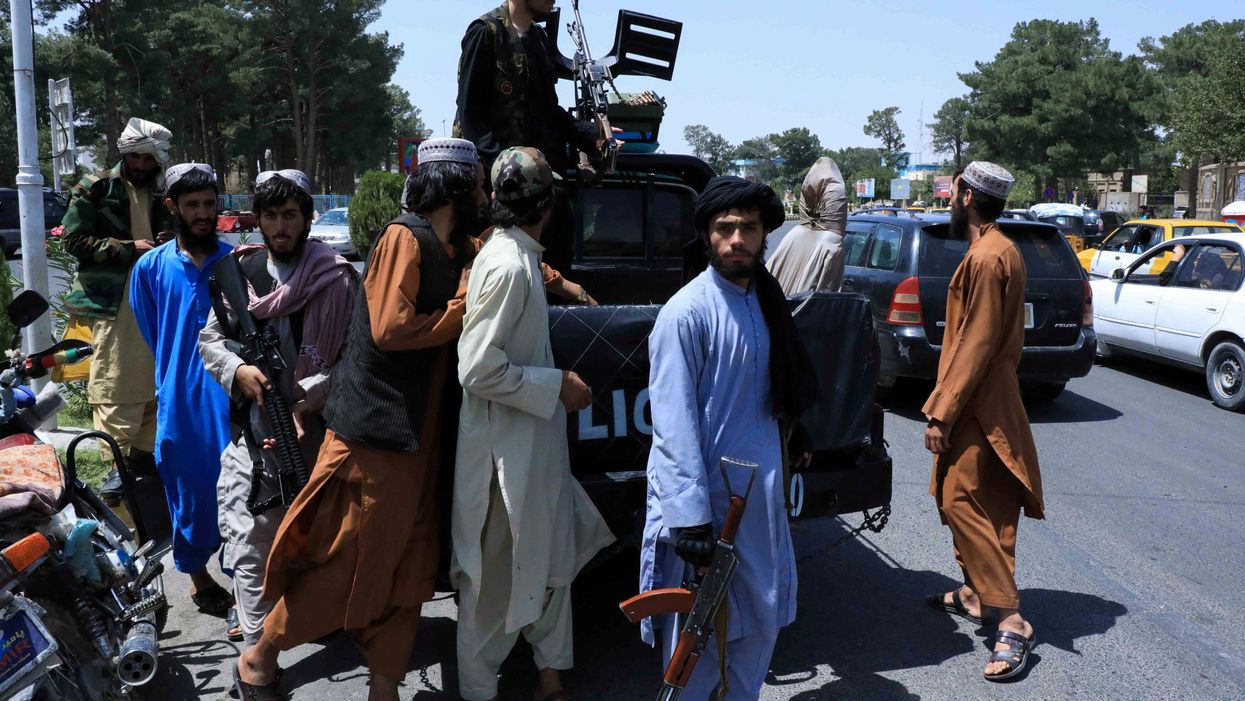On Sunday, Taliban forces took control of capital city Kabul and remaining areas of the country, some six months after US President Joe Biden announced he would start withdrawing the last of America’s troops.
President Ashraf Ghani fled the country “to avoid bloodshed” and said the Taliban had won the 20-year war in the region, in a statement.
The Taliban have said they will set up a government with no transition period and soon announce the Islamic Emirate of Afghanistan from the presidential palace.
Meanwhile, Afghans and foreigners are scrambling to leave. Around 4,000 British nationals and eligible Afghans are thought to be in the city and in need of evacuation.
So, what could the state of Afghanistan look like now under the Taliban?
Ideology
The Taliban believe in Sharia Law – a strict interpretation of Islamic law that they wish to impose on the nation.
As well as making strict rules for women when the regime was last in power from 1996 to 2001, the militant group banned television, music and cinema, and destroyed non-Islamic relics – such as in 2001, the famous Bamiyan Buddha statues in central Afghanistan.
Non-Islamic holidays were also banned.
Rules for women
When the group last ruled Afghanistan, women lived under a highly constricted regime. They could not work, girls were not allowed to attend school and women had to cover their faces and be accompanied by a male relative if they wanted to venture out of their homes.
As well as this, women were not allowed to wear high heels because men were not meant to hear women’s footsteps. Windows were covered to stop women from being seen from the outside and they were discouraged from speaking loudly in case they were heard.
Women were not allowed to appear on TV or have photos of them published and those who broke the rules sometimes suffered humiliation and public beatings by the Taliban’s religious police under the group’s strict interpretation of Islamic law. Reports also emerged at the time about forced marriages and sexual violence.
A Taliban spokesperson, Suhail Shaheen told BBC News that this would not be the case under the Taliban’s new regime. “We will respect rights of women ... our policy is that women will have access to education and work, to wear the hijab,” he said.
He restated the Taliban’s position that “no one should leave the country ... we need all the talents and capacity, we need all of us to stay in the country and participate”.
He added that, unlike in the past, women “will have access to education and work” and be able to leave their homes without male accompaniment.
However, his commitment will be called into question as, when asked about violent punishment of those who break rules – like amputations, stonings, and executions of criminals – Shaheen said: “That is up to the religious followers and the courts. They will decide about the punishment.”
Meanwhile, things are already happening in the region which already suggest that life for women is changing. Yesterday, a man was seen painting over images of women in wedding dresses outside a beauty salon in Kabul.
Taliban forces are already preventing women from going to work. In early July, fighters from the group walked into the offices of Azizi Bank in the southern city of Kandahar and ordered nine women working there to leave.
The gunmen escorted them to their homes and told them not to return to their jobs. Instead, they explained that male relatives could take their place, according to three of the women involved and the bank’s manager.
Amin Saikal, the author of Modern Afghanistan: A History of Struggle and Survival, told CNN the Taliban did not want Afghanistan to become a pariah state, and wanted to continue receiving international aid. But Saikal said: “As far as their ideological commitment is concerned, they have not really changed.”
Meetra Qutb, a researcher who left Afghanistan four years ago, told the PA news agency: “The past days and months have been very critical and concerning for women in the country.
“Many fear history will repeat itself with a compromise on their rights and are very scared that a dark future lies ahead.“
She has urged the UK Government and its allies to “put the pressure on” the Taliban to ensure women’s rights are maintained. Qutb added: “The fear of persecution means many women are likely to stay silent – they are scared and traumatised and don’t want to bring danger on their families.
“I think women in positions of power who are negotiating with the Taliban should speak out about this issue.
“I also believe the UK Government should be doing the same, making sure we don’t lose the last 20 years of progress – they need to put the pressure on them.
“For the sake of humanity I would expect the people in the UK and Europe to raise their voices for the women of Afghanistan to prevent disaster and human tragedy.”
Afghan-American author Khaled Hosseini said the gains Afghan women have made over the past 20 years are “up in the air”.
Speaking to the BBC, he added that US president Joe Biden failed to show “empathy” for the Afghan people during a speech in which he said he stands “squarely” behind the US exit.
Meanwhile, an Afghan girl voiced her despair about the situation in a video which went viral after it was posted to social media over the weekend. The unknown girl said: “We don’t count because we were born in Afghanistan,” the tearful girl laments in the clip.
“I cannot help crying,” she adds. “No one cares about us. We’ll die slowly in history.”
Let’s hope that she’s wrong.














